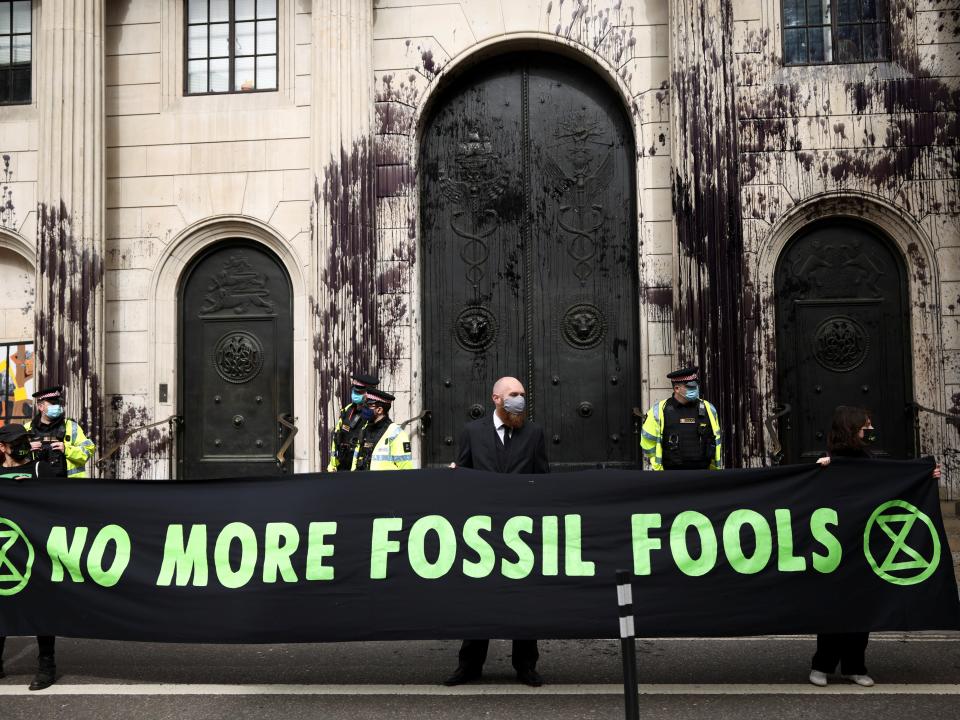Why we are shining a light on UK support for fossil fuels

The UK has gone through something of a transformation when it comes to fossil fuels. Britain led the industrial revolution in the 1800s and was the world’s largest emitter of greenhouse gases until the turn of the 20th century. Fast forward to the 21st century and the UK’s relationship with fossil fuel power has started to shift dramatically. In 2012, coal generated 41 per cent of the country’s electricity. By 2019, it supplied just 2 per cent.
The last few years have also seen the government put forward some agenda-setting climate policies. In 2019, the UK became the first major economy to set a legal target of reaching net-zero emissions by 2050. Other major economies including the EU, Japan and Canada later followed suit. At today’s high-level Earth Day summit, the UK confirmed an ambitious pledge to slash emissions by 78 per cent on 1990 levels by 2035.
And last December, the government announced an end to direct taxpayer support for fossil fuel energy projects overseas. Given that the UK has provided £21bn in support for oil and gas exports through trade promotion and export finance in the past four years alone, the new policy marks a significant change in direction.
But while progress has been made, the clear message from climate scientists, environmental campaigners and concerned politicians is that it is still not enough.
Green groups were left bitterly disappointed by the details of the government’s recent North Sea transition deal – an agreement made with the oil and gas industry to facilitate the sector’s move away from drilling for fossil fuels.
The deal refuses to rule out new licences for oil and gas drilling in the North Sea. It includes a pledge to cut offshore operational emissions by 50 per cent on 2018 levels by the end of the decade, but this is “significantly lower” than what will be needed to reach the UK’s 2050 target, according to the country’s independent climate advisers.
The UK’s landmark policy on ending overseas direct financial support for fossil fuels, which came into force on 31 March, has also left some academics and campaigners with serious concerns.
The government has promised to end export finance, aid funding and trade promotion for new coal and oil projects and most fossil gas developments. However, the UK’s development bank, which is known as the CDC group, is currently not required to comply with the new rules.
While the CDC group has set its own policy on fossil fuels which it claims is in line with the government’s new pledge, campaigners remain concerned that the bank will continue to pour money into overseas projects. In 2019, fossil fuels were responsible for 85 per cent of the total electricity generated and distributed through CDC investments, analysis shows.
Away from Westminster, the UK’s largest banks are also coming under rapidly increasing scrutiny for their role in funding fossil fuel projects overseas.

A recent landmark report from a coalition of NGOs found that the world’s 60 largest banks have provided $3.8 trillion (£2.8 trillion) in finance for fossil fuels since the Paris Agreement was made five years ago. The UK’s top five banks – Barclays, HSBC, NatWest, Lloyds and Standard Chartered – provided around $304bn of this funding, the report says.
Barclays is Europe’s largest fossil fuel financier, according to the report. It alleges that, in 2020, the high street bank provided finance linked to a highly controversial coal mining project in Australia, oil and gas drilling in the Arctic and a fracking project in Argentina’s Patagonia region.
On Wednesday, 43 of the world’s biggest banks signed up to a commitment to slash the climate impact of their lending by 2030, in line with an overall goal of reaching net zero emissions by 2050.
However, campaigners described the deal as a “missed opportunity”.
“Many European banks are already working towards the bulk of the mandatory guidelines set out by the alliance,” said Jeanne Martin, a senior campaigner at ShareAction, a charity for responsible investment. “Net-zero plans cannot be considered credible without addressing underwriting and setting dates to phase out financing for fossil fuels and deforestation.”
It is clear that the UK’s political and financial systems need to do more to end their support for fossil fuels. And, as the UK gears up to host Cop26 later this year, the need to show global leadership on ending support for new fossil fuel projects has never been greater.
The conference will be a key moment for getting the world on track for meeting the goals of the Paris Agreement, the major climate deal reached by countries five years ago. A recent progress report from the UN found that new climate plans put forward by countries by the end of last year would cause emissions to fall by just 1 per cent by 2030, when compared with levels in 2010.
With talk of cutting reliance on fossil fuels, it’s also important to highlight potential alternatives – the green initiatives in need of investment, such as solar mega-projects in sub-Saharan Africa or offshore wind in the North Sea; how to avoid mass unemployment when turning away from oil and gas.
In the build-up to Cop26, our Stop Fuelling The Climate Crisis campaign will highlight areas where meaningful change can be achieved as the UK looks to lead the world on the climate crisis. Bold targets and pledges show welcome ambition, but the planet also needs action.
Read More
Earth Day: Greta Thunberg testifies to US politicians on climate crisis
Greta Thunberg urges US Congress to ‘use your common sense’ on climate crisis
Covid recovery must not be driven by fossil fuels, says Ed Miliband

 Yahoo Finance
Yahoo Finance 